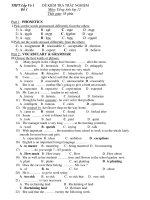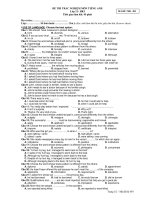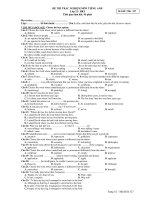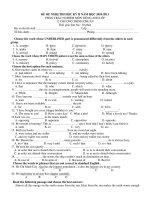Tải Trắc nghiệm Reading tiếng Anh lớp 12 Unit 1 Life Stories - Bài tập Unit 1 lớp 12 Life Stories có đáp án
Bạn đang xem bản rút gọn của tài liệu. Xem và tải ngay bản đầy đủ của tài liệu tại đây (83.52 KB, 9 trang )
<span class='text_page_counter'>(1)</span><div class='page_container' data-page=1>
<b>TRẮC NGHIỆM TIẾNG ANH 12 MỚI </b>
<b> THEO UNIT</b>
<b>UNIT 1: LIFE STORIES</b>
<b>Bài 1. Read the following passage and mark the letter A,</b>
<b>B, C, or D on your answer sheet to indicate the correct</b>
<b>answer to each of the questions.</b>
</div>
<span class='text_page_counter'>(2)</span><div class='page_container' data-page=2>
or February. It is televised around the world and is watched by millions of people
each year.
<b>Question 1: What do officials do during the game of football?</b>
A. build up excitement among the fans
B. supervise the game
C. take up tickets
D. spectate the game
<b>Question 2: As mentioned in the text, who are the most active when their team</b>
has the ball?
A. offensive players
B. defensive players
C. the officials
D. the fans
<b>Question 3: Playing American football is the most similar to playing</b>
A. rugby football
B. basketball
C. baseball
D. volleyball
</div>
<span class='text_page_counter'>(3)</span><div class='page_container' data-page=3>
A. their legs and arms
B. their heads
C. the whole body
D. their faces
<b>Question 5: When is the most famous football game held annually?</b>
A. in the fall
B. January
C. February
D. January or February
<b>Question 6: Why are there white rings on each end of the football?</b>
A. to mark off the distances to the end zone
B. to help players run
C. to help players score
D. to help players see the ball
<b>Question 7: The word "grip" in the passage means to</b>
A. avoid something
B. take something away
</div>
<span class='text_page_counter'>(4)</span><div class='page_container' data-page=4>
D. detect something
<b>Question 8: Which is the most popular sport in the US?</b>
A. Rugby football
B. Soccer
C. American football
D. It's not mentioned
<b>Question 9: How many people watch the match every year?</b>
A. millions
B. billions
C. a million
D. a billion
<b>Bài 2. Read the following passage and mark the letter A,</b>
<b>B, C, or D to indicate the correct answer to each of the</b>
<b>questions.</b>
</div>
<span class='text_page_counter'>(5)</span><div class='page_container' data-page=5>
play with one ‘best friend’ and their play includes a lot of conversation. Little boys
often play games in groups, their play usually involves more doing than talking. In
school, girls are often better at verbal skills, while boys are often better at
mathematics.
A recent study at Emory University helps to shed light on the roots of this
difference. Researchers studied conversation between children aged 3-6 and their
parents. They found evidence that parents talk very differently to their sons than
they do to their daughters. The startling conclusion was that parents use more
language with their girls. Specifically, when parents talk with their daughters, they
use more descriptive language and more details. There is also far more talk about
emotions, especially with daughters than with sons.
<b>Question 1: Which sentence best expresses the main idea of the first paragraph?</b>
A. Women talk more than men on the whole
B. Women’s talking is a stereotype
C. Women talk more in private, and men talk more in public
D. Little boys and little girls have different ways of playing
<b>Question 2: Which word is similar in meaning to the word “glue” ?</b>
A. games
B. sticky substance
C. rope
</div>
<span class='text_page_counter'>(6)</span><div class='page_container' data-page=6>
<b>Question 3: Which of the following phrases best explains the meaning of the</b>
word “verbal”?
A. Deriving from verbs
B. Connected with use of spoken language
C. Using very loud noise
D. Being very talkative
<b>Question 4: The word “they” refers to___________.</b>
A. Situations
B. Men
C. Men and women
D. Women
<b>Question 5: Which sentence best expresses the main idea of the second</b>
paragraph?
A. Researchers have studied the conversations of children and their parents.
B. Parents do not talk much about sadness with their sons.
C. Study at Emory University can help to explain the differences between
communication styles of boys and girls.
</div>
<span class='text_page_counter'>(7)</span><div class='page_container' data-page=7>
<b>Question 6: Which of the following statement is TRUE about the passage?</b>
A. Parents give more love to their daughters than to their sons.
B. Boys don’t like to be with their parents as much as girls do.
C. Parents use more language to talk with their daughters.
D. Boys don’t like showing emotions.
<b>Bài 3. Read the passage and fill the blanks.</b>
<b>MY HOBBY</b>
I (1)_________ learning the guitar when I (2)_________ ten years old. My first
guitar was a present from my uncle. It was very old and needed repairing, but I
loved it and used to play it until my fingers hurt. On my twelfth birthday, my father
(3)_________ me a new brand one, and I (4)_________ going on with private guitar
lessons. My teacher teaches classical guitar, which I like, but I really want to play
rock music. Sometimes I (5)_________ an electric guitar. It is very loud and my
mother always (6)_________ it. Unfortunately it is not mine, it is my friend’s. My
ambition (7)_________ to play in a rock band and make records; I would like to
travel around the world, playing in different countries. My friend is a good singer, so
we are going to form a band together. All we need to do is finding a drummer and a
bass player. I (8)_________ some songs in the future. And then, we (9)_________
in my bedroom. I’m sure my mother (10)_________.
1. A. started B. start C. has started D. had started
</div>
<span class='text_page_counter'>(8)</span><div class='page_container' data-page=8>
3. A. buys B. had bought C. bought D. will buy
4. A. will start B. start C. has started D. started
5. A. am playing B. play C. has played D. had played
6. A. hates B. hate C. will hate D. hated
7. A. is being B. was C. is D. had been
8. A. write B. will write C. has written D. had written
9. A. has practised B. practised C. practise D. will practise
10. A. won’t mind B. doesn’t mind C. aren’t minding D. hadn’t minded
<b>Đáp án</b>
<b>Bài 1. Read the following passage and mark the letter A,</b>
<b>B, C, or D on your answer sheet to indicate the correct</b>
<b>answer to each of the questions.</b>
1. B 2. A 3. A 4. A 5. D 6. D 7. C 8. D 9. A
<b>Bài 2. Read the following passage and mark the letter A,</b>
<b>B, C, or D to indicate the correct answer to each of the</b>
<b>questions.</b>
1. C 2. B 3. B 4. B 5. D 6. C
</div>
<span class='text_page_counter'>(9)</span><div class='page_container' data-page=9>
1 - A; 2 - B; 3 - C; 4 - D; 5 - B;
6 - A; 7 - C; 8 - B; 9 - D; 10 - A;
Mời bạn đọc tham khảo thêm tài liệu Tiếng Anh lớp 12 tại đây:
Bài tập Tiếng Anh lớp 12 theo từng Unit:
Bài tập Tiếng Anh lớp 12 nâng cao:
</div>
<!--links-->









